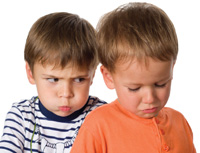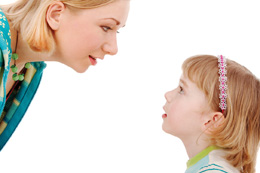 We all say these words. We ask — no, make that insist — our children say them, and we expect to hear them regularly from friends, relatives, even perfect strangers.
We all say these words. We ask — no, make that insist — our children say them, and we expect to hear them regularly from friends, relatives, even perfect strangers.
The words “I’m sorry” reverberate through homes, playgrounds, family functions and just about everywhere, just about incessantly. In fact, between kids apologizing to parents and parents apologizing to kids, it sometimes seems as if we live in a sad sea of sorry.
Does good parenting mean always having to say you’re sorry?
Clearly, many parents think so. When is the last time you spent more than 15 minutes with a parent and his child and didn’t hear at least one of them utter the S word?
Elizabeth Bevins, a Maple Valley mother of a 4-year-old boy and 22-month-old girl, jumped on the “I’m sorry” train early on. But Bevins revised her allegiance to those two ubiquitous words following an epiphany of sorts at a parenting seminar. “If your kids don’t mean it, don’t make them say it,” said the seminar leader. That got Bevins wondering, “What exactly am I teaching my children?”
She decided that forcing them to apologize taught them to lie to make her happy, she says. “It was a way to get ‘time out’ over with.” It didn’t teach them anything about compassion or empathy — and didn’t make them genuinely sorry, says Bevins.
Why we like it
Why do parents overembrace apologies? Katherine Yasi, a Seattle childcare provider, contends that today’s busy working parents don’t always understand their kids’ normal developmental stages because they’re not around other children enough.
“In the old days, you’d go to the park and see other kids,” Yasi says. “You’d realize your kid isn’t the only one who’s shoving or misbehaving.”
Normal, age-appropriate behavior is nothing to apologize for, she says. Insisting on an apology — especially from a young child — is counterproductive. “Kids may not understand what it means; they don’t know the language,” she says. “It’s the adult who’s placing grown-up values on what they want the child to do.” The child’s takeaway lesson? “He learns ‘Mom is powerful, and I need to say these words so she’ll leave me alone,’” says Yasi.
When we force “sorry” from our kids, the word loses its meaning, says psychologist Michael Riera, Ph.D., author of Uncommon Sense for Parents with Teenagers. (Riera will be speaking at Town Hall in Seattle on Wednesday, March 23; visit parentmap.com/lectures for tickets.)
“We’ve gone too far with it,” he says. “It harkens back to my mother saying, ‘You didn’t mean it. Say it as if you mean it.’ Which, of course, you can’t make happen.”
When a child isn’t ready to apologize, Riera won’t make him. “I’ll say, ‘I need you to think about it,’” he says. “After five minutes, if he still doesn’t want to say it, I’ll say, ‘We’ll come back later. You need to feel you’re sorry.’”
Do parents ramp up their “sorry” demands when other parents are watching? Yes, says Bevins. “In public, it’s expected. If you don’t insist on the ‘I’m sorry,’ it’s like you’re being rude.” Tacoma dad Tod Bloxham agrees. “We all get caught doing that, trying to impress other parents.”
The artful apology
Real apologies — the kind that mean something — take more than words. “You want to combine feelings and action,” says Riera. “As in, ‘We’re glad to hear you’re sorry. Now what are you going to do to make it right?’”
Let’s say your 5-year-old hurls a toy across the room. He says he’s sorry. Now what? “He could offer to carry the trash out or take the dog for a walk,” says Riera. “That should be part of the apology. Otherwise it’s just too easy.”
Behaviors have consequences, and that’s what kids need to learn, says Bellevue psychologist Kristi Kwon, Ph.D. “Just ‘sorry’ won’t change behavior,” she says. “We want them to develop a sense of right and wrong, to have empathy for others and to develop a sense of ethics.”
 Talk to kids about their feelings, she says. “If a child hits another child, it’s fine for her to say, ‘I’m sorry.’ Then discuss what she did and why — and validate her emotions. Say, ‘You were angry when you did that.’ But let her know it’s not OK to hit.”
Talk to kids about their feelings, she says. “If a child hits another child, it’s fine for her to say, ‘I’m sorry.’ Then discuss what she did and why — and validate her emotions. Say, ‘You were angry when you did that.’ But let her know it’s not OK to hit.”
That’s what Heather Guthrie, a Monroe parent of three, tries to do. “I ask, ‘Do you know why you are saying you’re sorry? What can you do differently next time?’”
Don’t think it’s just the kids who are repeat regretters. Parents find themselves sorry for, well, lots of things. “I think parents should be accountable, too,” says Guthrie. “And it shows your kids you’re not perfect.”
But watch out for apology overuse. “If you find yourself apologizing to your children all the time, what’s that all about? Isn’t it about time you change your behavior?” asks Riera. “You’re teaching your kids apologies don’t mean anything.”
It’s OK to apologize if you’re actually at fault, says Kwon. But never, ever apologize for being a parent. If you’re grounding your teen, don’t say, “I’m sorry you can’t go out,” she says, and don’t tell a toddler you’re sorry for sending him to his room. “You’re the parent,” says Kwon. “You’re setting limits. That’s your job.”
Linda Morgan is ParentMap’s education editor and the author of Beyond Smart: Boosting Your Child’s Social, Emotional, and Academic Potential. Learn more about Linda at linda-morgan.com









